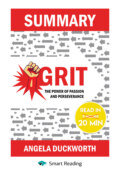
Smart Reading
Summary: Accidental Genius. Using Writing to Generate Your Best Ideas, Insight and Content. Mark Levy
Автор:
Mark Levy
Оригинальное название:
Accidental Genius. Using Writing to Generate Your Best Ideas, Insight and Content
www.smartreading.ru
What is freewriting?
When there is a problem that is difficult to solve head-on, workarounds are needed. Mark Levy is convinced that we already have the answers in our heads. You just need to learn how to extract them.
The mind stores a huge amount of information and knowledge. Thoughts, dreams, memories and desires constantly arise in our minds. We think that they appeared spontaneously. What if that is not the case? We give birth to them.
There is a mechanism that is yet unknown to us, but in certain situations it switches on, giving rise to brilliant hypotheses, breakthrough discoveries, or just great ideas. We don’t know how it works, but we do know what affects it. Apparently, there is a skill that allows you to get access to what is in your head at will.
How do you like the idea of changing your life for the better through writing? Freewriting is a writing skill that can help you find solutions to any life situation. It can become the basis of a successful career for journalists, copywriters, bloggers and book authors. Texts created in this way will become even more attractive to your audience, and the process of writing them will become more efficient. In fact, anyone can benefit from the skill of freewriting, regardless of age or profession. It helps people get to know themselves and the world around them, while promoting further personal development.
The Benefits of Freewriting
▶Increases the efficiency of the brain.
▶Forces the brain to think more widely, deeply, and less stereotypically.
▶Helps to generate fresh and ingenious thoughts.
▶Allows you to use the power of your own intelligence to solve life’s problems.
Being an educated person, you must have thought, "The benefits sound amazing. Tell me right now, what is it going to cost me?"
Well, you will have to write a lot. Then write some more. And then write some more. And do so every day. But freely and sincerely. Anyone can develop freewriting skills, as freewriting is a system. Below you will learn the six principles of freewriting, as well as get to know many of the techniques used by Freewriters, which will enhance the effectiveness of this technique.
It is important that we write for ourselves. The goal of freewriting is to sort out our thoughts, to move to a level of thinking beyond the scope of everyday life. The main part of this book is devoted to the development of this skill in this context.
However, freewriting can be used to solve any problem, including the need to write ingenious texts. The author cites many recommendations for those who write to the general public.
In any case, having the right attitude is vital. If you want to learn everything all at once, stop reading this summary now. If you want to learn piece by piece, and gradually, then continue reading. This type of attitude can lead to success for those who choose to learn freewriting.
Everything Should Be Natural
Turn Off the Inner Critic
How often, before you start to say something, you begin by saying it in your head? Gotcha! This is how your inner critic works. He wants you to look good. This is a defense mechanism. On the one hand, it helps adapt socially, but on the other hand, it limits our ability to think outside the box.
This inner critic is very conservative. He always issues his critique along the same lines. Look around. How many people are going around and around in circles? They continue to do what they have always done, because their censor sits on his throne, and ruthlessly erases any rebellious thoughts from their first and natural reactions and impressions.
But we want to smash this circle and this requires breakthrough ideas. And such ideas originate from primary, sincere and original thoughts. But how do we get to them? By moving this inner critic to the background and giving a voice to the part of the mind that gives rise to ideas. Our goal is to achieve the natural functioning of the mind.
However, a fair question arises. Why waste the paper when there are other ways to express thoughts, like telling a friend by phone? Here’s why. Writing is important for two reasons.







